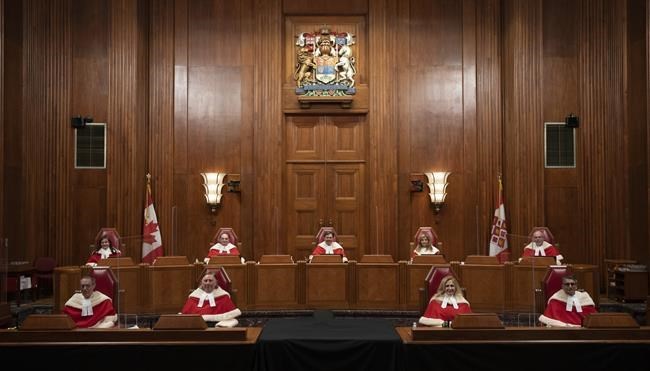OTTAWA — A person accused in a sexual assault trial does not have the right to ambush their accuser with private records like medical files or personal journals in a bid to discredit them, the Supreme Court of Canada ruled Thursday, as it upheld expanded rape shield laws passed by the federal government in 2018.
The decision relates to verdicts by appeals courts from two separate sexual assault cases — one in British Columbia and one in Ontario — both of which had said the changes made to rape shield laws four years ago affected an accused's right to a fair trial.
In the top court's 6-3 decision, a majority of justices disagreed, overturned those decisions and upheld the 2018 legislative changes to the Criminal Code as "constitutional in their entirety."
The Charter of Rights and Freedoms guarantees an accused a right to a fair trial, including that they are presumed innocent until proven guilty. It does not, the majority ruling says, "guarantee the most favourable procedures imaginable for the accused."
The rights of a complainant, and the public, must weigh on the fairness of a trial as well, the court said.
Rape shield laws began appearing in Canada four decades ago to prevent a complainant in a sexual assault case from having evidence of their sexual history used to discredit them.
The Criminal Code says evidence of a complainant's prior sexual activities that are unrelated to the charges at hand can only be admitted with permission of a judge following a private hearing, and cannot be used to infer that the complainant is less trustworthy or more likely to have consented.
In 2018, the Liberals expanded the definition of what that evidence includes to add communications of a sexual nature such as emails and videos, as well as documents about the complainant that are in the possession of the accused.
That latter group can include a complainant's diary, her medical records or personal letters.
They also granted a complainant the right to participate in the screening hearing with the judge and be represented there by a lawyer.
The changes were recommended in a 2012 Senate report. However, they weren't introduced until 2017, after the high-profile trial of former CBC personality Jian Ghomeshi raised questions about the defence's use of private emails sent by a complainant to contradict her earlier testimony that she had not contacted Ghomeshi after the alleged assault.
The majority opinion in Thursday's ruling says the law doesn't provide an accused the right to proceed with an "unfair or irrelevant cross-examination only because they consider it to be their most effective strategy.
"In this case, ambushing complainants with their own highly private records at trial can be unfair to complainants and may be contrary to the search for truth," the decision reads.
The judges said while progress has been made by Parliament to balance the rights of an accused to a fair trial with the public interest, and the rights of a complainant to dignity, equality and privacy, "more needs to be done.
"Statistics and well-documented complainant accounts continue to paint a bleak picture," the ruling says. "Most victims of sexual offences do not report such crimes; and for those that do, only a fraction of reported offences result in a completed prosecution."
Dalya Israel, executive director of Women Against Violence Against Women Rape Crisis Centre in Vancouver, which intervened in the case, said "overall we're really happy" with the result. She added there are still potential loopholes, as survivors are likely to be excluded from discussions between a judge and legal counsel about exactly what is, and is not, a private record.
But she said the court's acknowledgment that there is still work to do to protect the rights of complainants "gives us hope that change is possible."
Dawne Way, who represented the complainant who appealed the Court of Appeal for Ontario's decision on the evidence laws, said her client is "absolutely thrilled about it."
"I think that my client has been incredibly courageous in taking this all the way up to the Supreme Court," she said. "You know, she did that on behalf of all sexual assault complainants in Canada."
Daniel Brown, a defence attorney and vice-president of the Criminal Lawyers' Association, which was an intervener in the case, said the court decision is "disappointing" because it lacks clarity on what specific records must be included in the screening process, and could add significant amounts of time to the court process.
What if, Brown asked, there are hundreds of thousands of text messages between spouses who are later in court in a sexual assault case: Does the defence have to ask the judge have to go through every message to determine admissibility in case one of those messages later becomes relevant to the defence?
"We're going to spend days of court time examining particular messages and determining, 'does this meet this broad definition of privacy that the Supreme Court has articulated?"
Brown said allowing a complainant to participate in the screening process, with a lawyer, gives a complainant in a sexual assault case access to information that could help tailor the evidence they give on the stand, knowing what the defence is going to ask about.
"It gives the complainant an unfair advantage that doesn't exist in any other criminal case."
This report by The Canadian Press was first published June 30, 2022.
Mia Rabson, The Canadian Press

